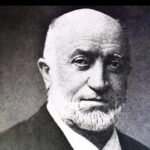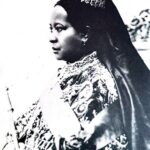MAIKELA, THOMAS MTOBI
- 5 Min Read
Thomas Mtobi Mapikela (circa 1879-1945), a builder and contractor, was a founding member of the African National Congress (ANC), originally known at the time of its formation in 1912 as the South African Native National Congress (SANNC). He was the organisation’s first Speaker, and its president in the Orange Free State for many years. He also became the parliamentary representative for the Free State urban areas on the Natives’ Representative Council (NRC).

PHOTO CAPTION: Thomas Mtobi Mapikela. SOURCE: sahistory.org
Of Mfeng origin, Mapikela was trained as a carpenter in the Grahamstown Native College, in what was then Cape Colony, and subsequently became a successful builder and contractor in Bloemfontein, in the Orange Free State. In 1908 he attempted to start a newspaper in Bloemfontein.
In 1909 he was chosen as a member of the deputation to England, led by W.P. Schreiner, which sought to have amendments made by the British parliament to the South African Union Constitution Act. The delegation was, however, unsuccessful: The British parliament had other preoccupations and decided that the matter should be settled in South Africa, although it recommended that the white South African Parliament modify the provisions of the colour bar in the South African Constitution.
Upon the formation of the SANNC, Mapikela was elected as Speaker of the Congress, a position for which he was suited by his experience as a member of the Free State Native Congress since the turn of the century, as a delegate to London in 1909, as well as by his tact and moral strength. Another asset he possessed was his fluency in Zulu, English, and Sotho. At about this time he was nicknamed “Map of Africa” because of his name, “Mapikela,” and because he insisted that the whole of Africa was the Africans’ country.
Later, in 1914, he was a member of another SANNC delegation to London, which included Sol Plaatje, which sought to protest the South African Natives’ Land Act of 1913. The delegation received little satisfaction, however, and its mission was interrupted by the outbreak of World War I in August 1914. Mapikela returned to South Africa in September.
In the years that followed, Mapikela continued to make his mark upholding and promoting the cause of the ANC, of which he was president for several years. The central issues for which he fought included the “Colour Bar” Act of 1926, the inequitable distribution of the land, the pass laws, rural labour conditions, the denial of the franchise to Africans, and restrictions upon the mobility of African labour and upon African urban land tenure.
In June 1939, Mapikela was part of a large ANC delegation to Cape Town. The delegation had planned for weeks to hold discussions with Native Representatives in the South African Senate and House of Assembly and to interview the new minister of native affairs, H.A. Fagan. Its request to the government was for an extension of the individual vote in the Cape, as well as the extension of the new separate roll to all the provinces of South Africa. In justifying its case the delegation argued that a large number of educated people, including college graduates, existed in all provinces. Citizenship, they stated, was their right, for: “We are under the same flag, we have the same government, and our interests are identical.” Fagan, however, offered no promise of extending the franchise to all the black people of South Africa.
In the same year the Natives’ Representative Council, in a discussion led by Mapikela, rejected the government’s assertion that the urban areas were the creation of Europeans and reiterated its conclusion that Africans had a legitimate claim to the urban location in which they had made their permanent homes. Like other citizens, the government declared, Africans had the right to have their own homes on their ground in the near urban areas.
In 1943 the Deputy Prime Minister, Colonel Deneys Reitz, met a deputation consisting of the most influential of African leaders, Dr. A.B. Xuma and Professor Z.K. Matthews, Thomas Mapikela, the Rev. James Calata, and other prominent members of the NRC as well as a representative of the effectual Non-European Council of Trade Unions.
They protested against the pass laws. Reitz was so impressed with their case that he promised to write a memorandum for the prime minister but, he pointed out, he was bound by parliament and the United Party, so he could not commit himself. It was, however, suddenly announced that the police would ask for passes only where a crime was suspected. There was a startling drop in the pass-law arrests in Johannesburg, for example, arrests fell from 200 a day to 20. But this was a short-lived victory. The application of the passed laws, described by Mapikela as “the most vicious laws on the statute book,” was later again intensified.
Mapikela provided a comprehensive articulation of Congress policy. His tenacity was never flagged throughout his political career. By the later years of the 20th century, Mapikela as well as other stalwarts of the ANC, had become a symbol of African achievement.
ENOCH W.D. DUMA




